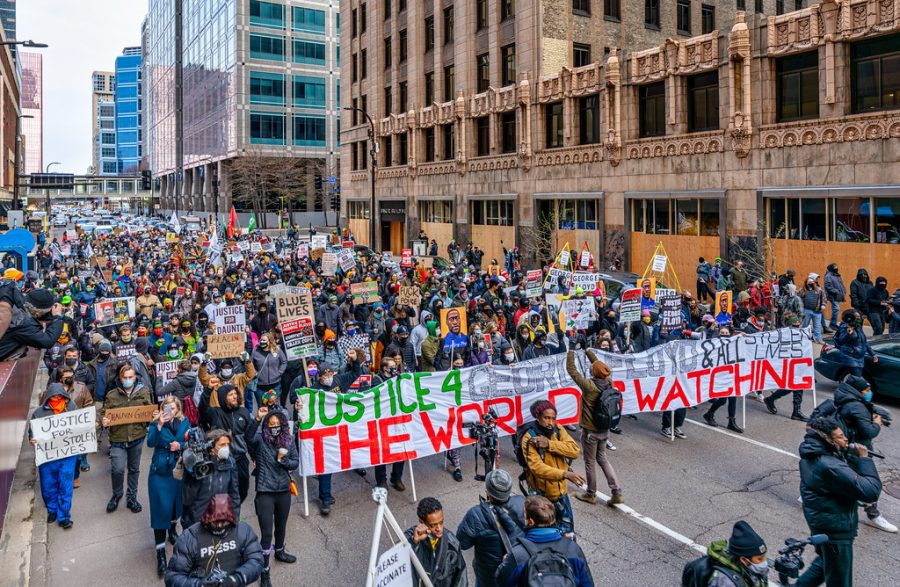Jury finds Chauvin guilty on all charges
Photo Tony Webster
Justice for George Floyd march through Minneapolis
On April 20, a jury convicted former Minneapolis police officer Derek Chauvin of second-degree unintentional murder, third-degree murder and second-degree manslaughter. The trial of Chauvin, the former officer who killed George Floyd, commenced on March 29.
The second-degree murder conviction could land Chauvin up to forty years in prison, while a third-degree murder conviction could result in up to twenty-five years and a second-degree manslaughter conviction up to ten years. However, Chauvin has no criminal record, meaning that his sentence is likely to be less than the maximum. Chauvin’s sentence hearing will begin in eight weeks.
According to Social Studies Teacher Kimberly Leegan, the extremely publicized nature of the murder and the case itself made this jury selection process much more intricate and complicated. “When a case is like this, normally [jury selection] panels are called in a couple hundred at a time,” Leegan said.
Ultimately, a group of fourteen male and female Black, white and mixed race jurors of all ages were selected from these hundreds of candidates.
Attorney General Keith Ellison led the prosecution, Attorney Eric Nelson led the defense team, and the judge that presided over the case was Hennepin County Judge Peter Cahill.
The prosecution focused on proving that the use of force by Chauvin was excessive, as well as that the fact that this use of force resulted in his death, and more specifically the murder, of Floyd. One of the most significant pieces of evidence used in the prosecution’s case was the nine-and-a-half-minute-long video of Floyd struggling as Chauvin kneeled on his neck.
“Believe your eyes,” said prosecutor Steve Schleicher during his closing argument. “Unreasonable force, pinning him to the ground — that’s what killed him. This was a homicide.”
The prosecution also included emotional testimonies from 17-year-old Darnella Frazier and Charles McMillian, who both witnessed the murder of Floyd. In addition, Minneapolis Police Chief Medaria Arradondo testified against Chauvin, stating that he does not condone Chauvin’s actions against Floyd, as they do not reflect the department’s ethics and values.
On the other hand, the defense was focused on convincing the jurors that Floyd’s death was not caused by Chauvin and that the level of force used was appropriate. Nelson argued that “a reasonable police officer” would have responded the same way that Chauvin did because of how the situation escalated. In their case, the attorneys presented evidence and testimonies to show the jurors the potential impacts of external factors, such as drugs, on Floyd that could have resulted in his death.
In the defense team’s closing argument, Nelson said, “It’s not the proper analysis. Because the 9 minutes and 29 seconds ignore the previous 16 minutes and 59 seconds [of interaction between Floyd and the police]. It completely disregards it. It says in that moment, at that point, nothing else that happened before should be taken into consideration by a reasonable police officer. It tries to reframe the issue of what a reasonable police officer would do.”
Though she understands that the accused have the right to defend themselves in a court of law, WHS senior Amanda Wendler felt that the arguments presented by Chauvin’s legal team could not be justified. “[The argument of the defense] was largely based on racism, and I think it was very clear to a lot of people that they were just invalid arguments,” said Wendler. “At this point in our country, some accountability needs to be taken and that is not what we saw.”
Despite these testimonies, the prosecution was able to prove beyond a reasonable doubt that Chauvin was guilty of all charges against him. For many, this day marked a historic moment in our country and an important step towards securing justice for victims of racially motivated police brutality. “I was really relieved to see that Chauvin was found guilty. I really hope that America can continue to make strides in the right direction,” said WHS senior Talia Malinsky.
However, given the current state of our nation’s policing system and the deeply-rooted racial biases still present, many see this verdict not as the end, but as the beginning of the country’s fight for racial justice.
“I think a lot of people think that this is an inflection point,” said Wendler “I don’t think this is an inflection point because Black people have been murdered by the police [and] by colonizers for hundreds of years and nothing has ever been done about it. While this is considered a historic moment for America, I don’t see this as an indication of any lasting change. I think we need reform to our policing system for that to happen, and we’re just not there yet as a country.”
Regardless of the magnitude of the change that comes from this trial, the verdict of this trial proves that the nation’s justice system is capable of delivering a verdict that reflects the ever-evolving values of the people.
“We got on our knees,” said George Floyd’s brother, Terrance Floyd. “Some of us stood up, but we asked the right one. We said – God, we need justice, we need it now. And he answered. I’m just grateful.”

